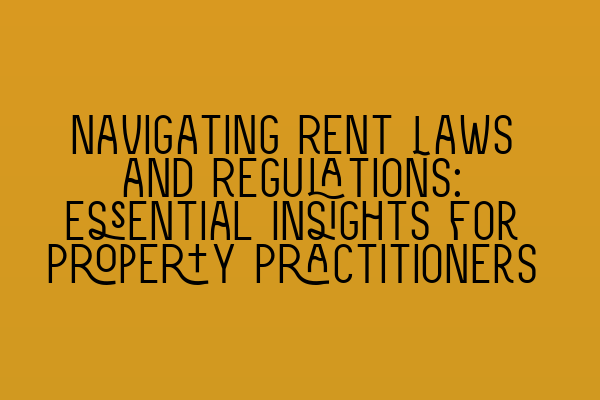Navigating Rent Laws and Regulations: Essential Insights for Property Practitioners
Rent laws and regulations play a crucial role in the property industry, governing the relationship between landlords and tenants. As property practitioners, it is essential to have a comprehensive understanding of these laws to provide sound legal advice and ensure compliance. In this blog post, we will delve into the key aspects of rent laws and regulations, providing essential insights to help property practitioners navigate this complex field.
Understanding Rent Control and Rent Stabilization
One significant aspect of rent laws is rent control and rent stabilization. These are implemented by governments to regulate the amount of rent that landlords can charge their tenants, preventing excessive rent increases and ensuring housing affordability. Rent control typically sets limits on rent increases, while rent stabilization allows for controlled rent increases based on specific factors.
In jurisdictions where rent control and rent stabilization laws exist, it is crucial to be familiar with the specific regulations and guidelines governing these areas. Some important considerations include allowable rent increase percentages, eviction regulations, and exemptions for certain types of properties. By being well-versed in these regulations, property practitioners can effectively advise landlords and tenants on their rights and obligations under such laws.
Tenant Screening and Background Checks
Another crucial aspect of rent laws is the tenant screening process. Property practitioners must ensure that landlords understand the legal parameters within which they can conduct background checks on potential tenants. This includes understanding fair housing laws, which prohibit discrimination based on protected characteristics such as race, religion, gender, and disability.
By providing landlords with guidance on conducting legally compliant tenant screenings, property practitioners can help mitigate potential legal risks and ensure a fair and equitable renting process. It is important to emphasize the importance of treating all prospective tenants equally and making decisions based on non-discriminatory factors, such as credit history, rental references, and income verification.
Lease Agreements and Tenant Rights
Rent laws also dictate the terms and conditions that must be included in lease agreements. Property practitioners must assist landlords in creating legally binding lease agreements that protect both their interests and the rights of tenants. This includes providing guidance on important elements such as security deposits, maintenance responsibilities, and eviction processes.
In addition to drafting comprehensive lease agreements, property practitioners must also ensure that landlords understand and comply with the various tenant rights granted by rent laws. These may include the right to habitable premises, privacy rights, the right to repairs, and protection from unlawful eviction. By educating landlords on these rights, property practitioners can help foster a balanced and fair relationship between landlords and tenants.
Eviction Procedures and Rent Arrears
When tenants fall into rent arrears or violate the terms of their lease agreement, eviction may become necessary. However, eviction procedures are highly regulated to protect tenants from unjust and unlawful evictions. Property practitioners have a critical role in guiding landlords through the eviction process, advising them on the necessary steps and ensuring compliance with applicable laws.
It is essential to be aware of the specific eviction procedures and requirements in your jurisdiction. This includes understanding the notice periods landlords must provide to tenants, the reasons for eviction allowed under the law, and the proper channels for pursuing eviction through the courts. By assisting landlords in navigating these complex procedures, property practitioners can help protect their clients’ interests while ensuring fairness and compliance with the law.
Staying Updated on Changing Rent Laws
Rent laws and regulations are not static but are subject to change and amendment over time. Property practitioners must actively stay informed and updated on any changes to rent laws in their jurisdiction. This can be achieved by regularly reviewing legal publications, attending industry seminars, and participating in relevant webinars and training sessions.
By staying updated on the latest developments in rent laws, property practitioners can provide accurate and informed advice to their clients. This ensures that landlords and tenants are aware of any new rights or obligations introduced by legislative changes, allowing them to navigate the rental landscape more effectively.
In conclusion, a deep understanding of rent laws and regulations is indispensable for property practitioners. By comprehending the intricacies of rent control, tenant screening, lease agreements, eviction procedures, and staying updated on changing rent laws, property practitioners can provide expert advice to landlords and tenants alike. This ability to navigate the complex rent landscape not only ensures legal compliance but also promotes fairness, equity, and stability in the property rental market.
For more related articles on contract law and other legal topics, feel free to explore the following resources:
– Understanding Contractual Capacity: Rights and Limitations: Understanding Contractual Capacity: Rights and Limitations
– Interactive SQE Mock Tests for Contract Law: Test Your Knowledge: Interactive SQE Mock Tests for Contract Law: Test Your Knowledge
– Join Our SQE Contract Law Webinars: Expert Insights and Guidance: Join Our SQE Contract Law Webinars: Expert Insights and Guidance
– SQE Prep: Mastering the Essentials of Contract Law: SQE Prep: Mastering the Essentials of Contract Law
– Contractual Capacity: Understanding Legal Competence in Contracting Parties: Contractual Capacity: Understanding Legal Competence in Contracting Parties
At SQE Property Law & Land Law, we provide comprehensive legal guidance and expertise in property law matters. Our team of solicitors is well-versed in rent laws and regulations, ensuring that our clients receive the best possible advice and representation. Contact us today to learn how we can assist you with your property law needs.
